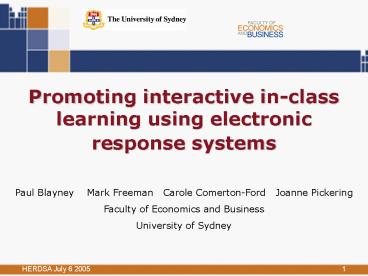Promoting interactive inclass learning using electronic response systems - PowerPoint PPT Presentation
1 / 24
Title:
Promoting interactive inclass learning using electronic response systems
Description:
Paul Blayney Mark Freeman Carole Comerton-Ford Joanne Pickering ... recall. simple rules-based problems. Build awareness and promote discussion (formative) ... – PowerPoint PPT presentation
Number of Views:63
Avg rating:3.0/5.0
Title: Promoting interactive inclass learning using electronic response systems
1
0
Promoting interactive in-class learning using
electronic response systems Paul Blayney
Mark Freeman Carole Comerton-Ford Joanne
Pickering Faculty of Economics and Business
University of Sydney
2
In my teaching for next year
0
- I will definitely use clickers
- I will consider using clickers
- I will monitor others success
- I have no intention of using clickers
- I will ignore clickers altogether
3
Introduction
0
- Objective
- Investigate impact of different response methods
to in-class questions - handheld audience electronic response system vs
show of hands vs display coloured cards - all other aspects of constructivist pedagogical
design constant - Motivation
- increase in-class interaction and feedback
- engage students in large diverse classes
4
Time spent preparing for this showcase?
0
- None
- 1 minute
- 2-5 minutes
- gt 5 minutes
5
This famous learning researcher is
0
- John Biggs
- Noel Entwistle
- Mike Prosser
- Paul Ramsden
- Keith Trigwell
6
0
After peer discussion, he is
- John Biggs
- Noel Entwistle
- Mike Prosser
- Paul Ramsden
- Keith Trigwell
7
Main interaction tactic in large classes?
0
- Little or no interaction
- Ask students if any questions
- Provide question - seek volunteer
- Provide question - pick student to answer
- Provide question - seek show of hands
- Provide question - promote peer discussion
- Provide question - responses via coloured paper
- Provide question - responses electronically
- Other
8
ERS positively impacts the class
0
- Strongly agree
- Agree
- Neutral
- Disagree
- Strongly disagree
9
Research on technology and ERS
0
- Judson Sawada (2002) review 30 yrs research
- Only positive effects upon student achievement,
related to incorporation of electronic response
systems into instruction, occurred when students
communicated actively to help one another
understand (p.178).
10
2nd yr UG accounting (n111)
0
11
Results 2nd yr UG accounting (n111)
0
No differences due to language, gender, age,
domestic/international etc
12
Results 1st yr PG finance
0
- Useful for obtaining feedback about
- Students backgrounds
- Students expectations
- Students approach to learning
- Useful for obtaining feedback about
- students knowledge of previous weeks lecture
- students understanding current lecture material
- Useful to help change expectations
- passive versus active
- time spent outside class in preparation
- 91 agreed ERS helped their learning
- 77 agreed peer interaction helped learning
13
Results 1st year UG accounting
0
- 2-hour tutorials (16 19 students)
- Use of MCQs student responses was the driving
factor behind improved student performance (not
the use of technology) - Show of hands, coloured cards, ERS
- Overheads, powerpoint, paper-based
- Individual only, individual-peer,
individual-peer-individual - Outcomes
- Attendance increased over the semester from 83
to 95 - Higher than average marks (by 5) in mid final
exams - ERS was the most preferred response method
14
Staff impacts
0
- If already interactive class design, then
marginal costs are limited - Logistics
- Getting equipment to location, set up time,
distribution and collection of handsets - Cost of equipment
- Once off purchase (vs publisher model where
students pay) - Lost handsets
- Learning and using Powerpoint add-in
- Publishers question banks
- Cell phone technology options solve some of these
15
Types of in-class questions for learning
0
- Test knowledge (formative or summative)
- recall
- simple rules-based problems
- Build awareness and promote discussion
(formative) - common misconceptions
- decision making
- theory simulation
- experiments and research
- Peer review (formative or summative)
- oral presentation
- poster
16
Cultural compatibility?
0
Clickers are compatible with existing practices,
values, needs, culture
- Strongly agree
- Agree
- Neutral
- Disagree
- Strongly disagree
17
Complexity?
Clickers appear complex to learn, understand and
use effectively
- Strongly agree
- Agree
- Neutral
- Disagree
- Strongly disagree
18
Ease of trialability?
It would be easy to experiment with clickers
before making an adoption decision
- Strongly agree
- Agree
- Neutral
- Disagree
- Strongly disagree
19
Visibility of results?
The results achieved by using clickers are
visible to other potential adopters
- Strongly agree
- Agree
- Neutral
- Disagree
- Strongly disagree
20
Relative advantages?
There are relative advantages of clickers over my
current teaching practice (in time, cost,
effectiveness, quality of results etc)
- Strongly agree
- Agree
- Neutral
- Disagree
- Strongly disagree
21
In my teaching for next year
0
- I will definitely use clickers
- I will consider using clickers
- I will monitor others success
- I have no intention of using clickers
- I will ignore clickers altogether
22
Conclusion
0
- Pedagogy is crucial to learning
- Technology in itself is not but may add value IF
- Electronic response systems
- can facilitate multiple types of questions
- novelty limitation?
- Anonymity appears to be a crucial aspect of
student learning to consider in designing for
learning - future research?
23
This was a valuable use of my time
- Strongly agree
- Agree
- Neutral
- Disagree
- Strongly disagree
24
Types of in-class questions for teaching
- Administration
- attendance record
- completed homework
- Formative feedback
- understanding audience
- student preparedness
- lecture speed
- student understanding































